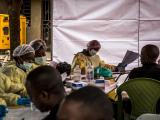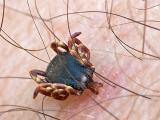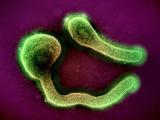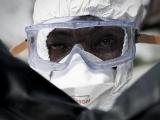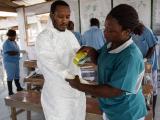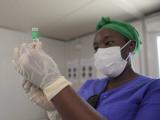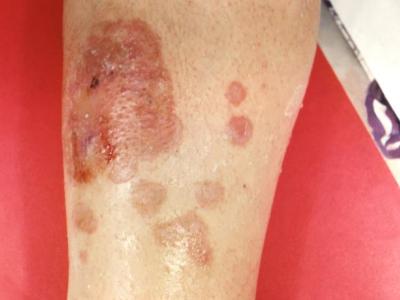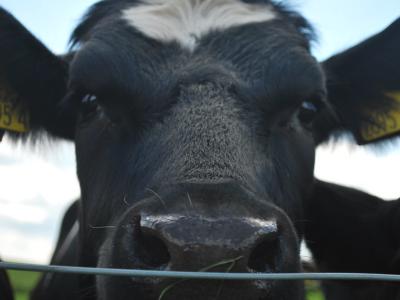Authorities counted 24 Ebola cases in West Africa last week, a slight dip from the previous week's 27, but hot spots persisted in western Guinea and nearby areas of Sierra Leone, the World Health Organization (WHO) reported today.
Sierra Leone had 14 cases in two districts, while Guinea had 10, in four prefectures, the WHO said. Liberia, where the epidemic was declared over on May 9, maintained its Ebola-free streak. The country has had no cases since late March.
The cumulative count of confirmed, probable, and suspected Ebola cases in the three countries Leone has reached 27,305, with 11,169 deaths, the WHO reported.
Today's report notes that the case count for the previous week (ending Jun 7) was lowered from 31 to 27 after it was determined that 4 previously confirmed cases in Guinea were false-positives.
The WHO also reported that 19 of the 76 cases recorded in the 3 weeks that ended Jun 14 arose from unknown sources or were linked to high-risk contacts, making clear that the drive to halt the epidemic still faces considerable challenges.
Of the 76 cases over 3 weeks, 69 (91%) came from two districts in Sierra Leone and three prefectures in Guinea, the agency said. Of the 69 cases, 55 were from well-described chains of transmission. But the other 14 cases, along with 5 from other areas, came from unknown sources or high-risk contacts, some of whom could not be traced.
Two Sierra Leone districts hot
In Sierra Leone, the 14 cases were reported in two districts: Kambia, which borders Guinea, and Port Loko, which adjoins Kambia. That compares with 15 cases in the same two districts the previous week.
The report says all 14 cases can be traced back to the secret movement of case-patients and contacts and secret burials of Ebola victims during April. To try to stop such clandestine activities, a set of enhanced surveillance and response measures will be introduced in Kambia and Port Loko in coming days.
"Measures include broadened criteria for the identification and tracing of contacts, improved incentives to increase compliance with quarantine measures and encourage the timely reporting and isolation of new cases, and expanded use of rapid diagnostic tests," the report states.
Thirteen of the 14 cases involved contacts of known previous cases. Investigation of the remaining case revealed that the patient became infected while sharing a ward with an Ebola patient in a private health facility. "A total of 20 health workers are registered as medium/high-risk contacts of the case, and are being monitored," the report says.
Officials were monitoring 443 Ebola patient contacts in three districts, Kambia, Port Loko, and Western Area Urban, at the end of the week.
Checkpoints in Guinea
Guinea's 10 cases were reported in four prefectures: Boke, 2; Conakry (the capital), 1; Dubreka, 4, and Forecariah, 3. Five of the 10 patients were registered contacts of other Ebola patients, but at least 4 of the other 5 arose from unknown sources.
To respond to the challenge of unknown transmission chains, health checkpoints have been set up in Boke and another western prefecture, Coyah, the WHO said. In other efforts, authorities conducted a 6-day door-to-door case-finding and sensitization campaign last week, leading to the detection of one case. Also, officials are working hard to trace high-risk contacts of three cases reported in Conakry over the past 2 weeks.
"Community engagement remains challenging in most affected prefectures of Guinea, but has improved with the increased integration of anthropologists into case investigation teams," the report states. It adds that 15 unsafe burials were reported last week, versus 19 the previous week.
As of Jun 14, authorities were monitoring 1,927 contacts of Ebola patients in eight Guinean prefectures.
No health workers infected
No new cases in healthcare workers were reported last week, prolonging a respite that began May 14, the report notes. But it warns there is "an extremely high likelihood" of cases among the 20 health workers who had contact with the patient who was infected in a private health facility in Port Loko, Sierra Leone.
The overall tally of cases in health workers remains at 869, with 507 deaths.
Vaccine trials struggling
In other news, a Reuters story today gave an update on the difficulties faced by Ebola vaccine trials with the decline of the epidemic, saying that a trial in Guinea is the only one that still may be able to demonstrate vaccine efficacy.
A vaccine trial in Liberia had been designed to include more than 28,000 volunteers, but researchers have had to stop recruitment people after reaching only a mid-stage target of 1,500 participants, the story said.
Johnson & Johnson originally had hopes of recruiting 350,000 people for a trial in Sierra Leone, but the company is now seeking only about 3,000 to 4,000 volunteers, according to the story.
"There's no doubt everybody is very happy we have so few Ebola cases, but obviously it's also a bit disappointing when there was so much effort and energy put into accelerating the vaccines that there are suddenly no cases for the trials," Marie-Paule Kieny, PhD, an assistant director-general at the WHO, told Reuters.
A ring vaccination trial under way in Guinea now offers "the only hope" of showing vaccine efficacy, said Kieny and Adrian Hill, MB, DPhil, director of the Jenner Institute at Oxford University, according to the story.
The trial involves vaccinating rings of contacts and family members around each new Ebola patient, either immediately or after 3 weeks, to see if the shot works. Kieny told Reuters that about 70 "rings" have been recruited so far, and initial data from these will be assessed next month to see if the trial should continue, be expanded, or be halted.
Despite the drastic cutbacks, the work done so far on the trials will not be all in vain, since safety and immune response data in humans can be combined with animal experiment data to potentially allow vaccines to be licensed, the story noted. That is possible under the US Food and Drug Administration's "animal rule."
Study of Ebola survivors launched
In other Ebola research news, the US National Institutes of Health (NIH) today announced the launch of a study of Ebola virus disease (EVD) survivors in Liberia. The trial, sponsored by the NIH's National Institute of Allergy and Infectious Diseases (NIAID) and the Liberian Ministry of Health, is expected to enroll about 1,500 Ebola survivors and 6,000 of their close contacts.
"The study investigators hope to better understand the long-term health consequences of EVD, determine if survivors develop immunity that will protect them from future Ebola infection, and assess whether previously EVD-infected individuals can transmit infection to close contacts and sexual partners," the NIH said in a press release.
Enrollment for the study began today at John F. Kennedy Medical Center in Sinkor, Monrovia, the release said. Three other medical facilities in Liberia will join in the effort later this month.
The researchers will follow the Ebola survivors and their contacts for 5 years, with visits every 6 months, the NIH said. The team will look for such problems as vision disorders, immune system changes, mental disorders, joint pain, diabetes, hypertension, and pregnancy complications, with close contacts used as a control group.
The study is one of three Ebola studies being conducted by PREVAIL—the Partnership for Research on Ebola Virus in Liberia, involving the US Department of Health and Human Services and Liberia's health ministry.
See also:
Jun 17 WHO Ebola situation report
Jun 10 CIDRAP News story on last week's WHO update
Jun 17 Reuters story on Ebola vaccine trials
Jun 17 NIH press release on study of Ebola survivors


